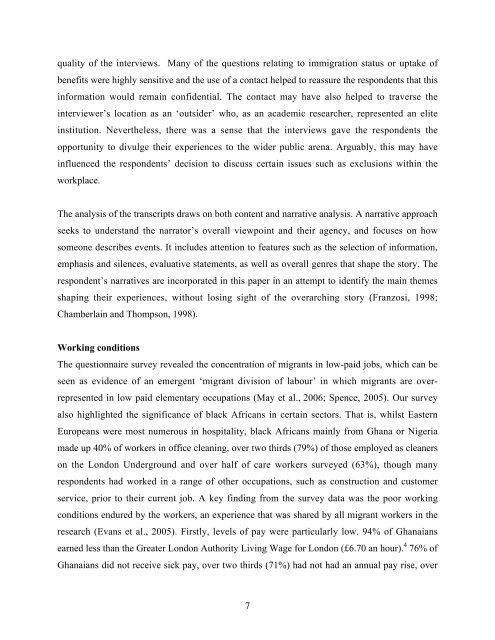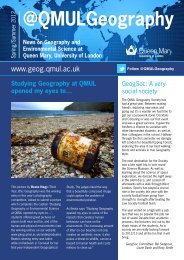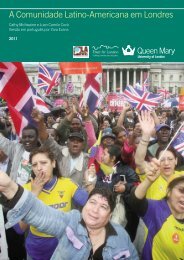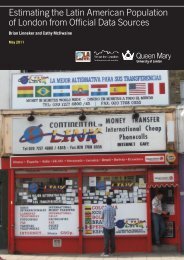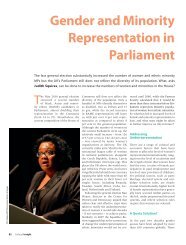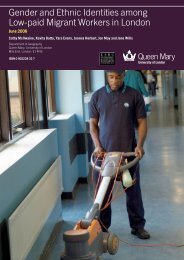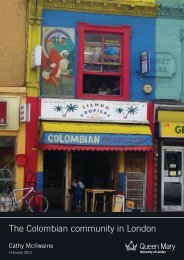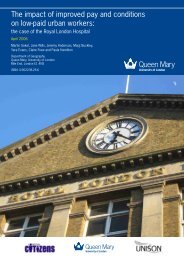Multiculturalism at work: The experiences of Ghanaians in London
Multiculturalism at work: The experiences of Ghanaians in London
Multiculturalism at work: The experiences of Ghanaians in London
- No tags were found...
Create successful ePaper yourself
Turn your PDF publications into a flip-book with our unique Google optimized e-Paper software.
quality <strong>of</strong> the <strong>in</strong>terviews. Many <strong>of</strong> the questions rel<strong>at</strong><strong>in</strong>g to immigr<strong>at</strong>ion st<strong>at</strong>us or uptake <strong>of</strong>benefits were highly sensitive and the use <strong>of</strong> a contact helped to reassure the respondents th<strong>at</strong> this<strong>in</strong>form<strong>at</strong>ion would rema<strong>in</strong> confidential. <strong>The</strong> contact may have also helped to traverse the<strong>in</strong>terviewer’s loc<strong>at</strong>ion as an ‘outsider’ who, as an academic researcher, represented an elite<strong>in</strong>stitution. Nevertheless, there was a sense th<strong>at</strong> the <strong>in</strong>terviews gave the respondents theopportunity to divulge their <strong>experiences</strong> to the wider public arena. Arguably, this may have<strong>in</strong>fluenced the respondents’ decision to discuss certa<strong>in</strong> issues such as exclusions with<strong>in</strong> the<strong>work</strong>place.<strong>The</strong> analysis <strong>of</strong> the transcripts draws on both content and narr<strong>at</strong>ive analysis. A narr<strong>at</strong>ive approachseeks to understand the narr<strong>at</strong>or’s overall viewpo<strong>in</strong>t and their agency, and focuses on howsomeone describes events. It <strong>in</strong>cludes <strong>at</strong>tention to fe<strong>at</strong>ures such as the selection <strong>of</strong> <strong>in</strong>form<strong>at</strong>ion,emphasis and silences, evalu<strong>at</strong>ive st<strong>at</strong>ements, as well as overall genres th<strong>at</strong> shape the story. <strong>The</strong>respondent’s narr<strong>at</strong>ives are <strong>in</strong>corpor<strong>at</strong>ed <strong>in</strong> this paper <strong>in</strong> an <strong>at</strong>tempt to identify the ma<strong>in</strong> themesshap<strong>in</strong>g their <strong>experiences</strong>, without los<strong>in</strong>g sight <strong>of</strong> the overarch<strong>in</strong>g story (Franzosi, 1998;Chamberla<strong>in</strong> and Thompson, 1998).Work<strong>in</strong>g conditions<strong>The</strong> questionnaire survey revealed the concentr<strong>at</strong>ion <strong>of</strong> migrants <strong>in</strong> low-paid jobs, which can beseen as evidence <strong>of</strong> an emergent ‘migrant division <strong>of</strong> labour’ <strong>in</strong> which migrants are overrepresented<strong>in</strong> low paid elementary occup<strong>at</strong>ions (May et al., 2006; Spence, 2005). Our surveyalso highlighted the significance <strong>of</strong> black Africans <strong>in</strong> certa<strong>in</strong> sectors. Th<strong>at</strong> is, whilst EasternEuropeans were most numerous <strong>in</strong> hospitality, black Africans ma<strong>in</strong>ly from Ghana or Nigeriamade up 40% <strong>of</strong> <strong>work</strong>ers <strong>in</strong> <strong>of</strong>fice clean<strong>in</strong>g, over two thirds (79%) <strong>of</strong> those employed as cleanerson the <strong>London</strong> Underground and over half <strong>of</strong> care <strong>work</strong>ers surveyed (63%), though manyrespondents had <strong>work</strong>ed <strong>in</strong> a range <strong>of</strong> other occup<strong>at</strong>ions, such as construction and customerservice, prior to their current job. A key f<strong>in</strong>d<strong>in</strong>g from the survey d<strong>at</strong>a was the poor <strong>work</strong><strong>in</strong>gconditions endured by the <strong>work</strong>ers, an experience th<strong>at</strong> was shared by all migrant <strong>work</strong>ers <strong>in</strong> theresearch (Evans et al., 2005). Firstly, levels <strong>of</strong> pay were particularly low. 94% <strong>of</strong> <strong>Ghanaians</strong>earned less than the Gre<strong>at</strong>er <strong>London</strong> Authority Liv<strong>in</strong>g Wage for <strong>London</strong> (£6.70 an hour). 4 76% <strong>of</strong><strong>Ghanaians</strong> did not receive sick pay, over two thirds (71%) had not had an annual pay rise, over7


